Russia warns Syria not to use chemical weapons, after threat by Assad official
Russia warns Syria not to use chemical weapons, after threat by Assad official
Statement by Syrian Foreign Ministry comes as top Iranian general threatens Arab states against possible repercussions of aiding the attempt to topple Assad regime.

A satellite image of al-Safir, Syria's main chemical weapons facility, near Aleppo.
Photo by GlobalSecurity.org
Russia
warned Syria on Tuesday not to use chemical weapons, saying Moscow
"proceeds from the assumption" that the government will adhere to its
international obligations.
In a statement, the Russian Foreign Ministry said Syria had ratified an
international protocol in 1968 that bars the use of poison gases as a
method of warfare.
US-trained cartel terrorises Mexico
| US-trained cartel terrorises Mexico | ||
|
Founders of the Zetas drug gang learned special forces techniques at Ft. Bragg before waging a campaign of carnage.
|
||
The Zetas have a fearsome reputation, but the real surprise comes not in their ruthless use of violence, but in the origins of where they learned the tricks of their bloody trade. |
Syria bolsters troops in battle for Aleppo
Activists say thousands of troops have been sent to Syria's second city, Aleppo, as clashes were reported in the city for the sixth consecutive day.
Fighting was reported in the central al-Jamaliya neighbourhood on Wednesday, close to the local headquarters of the ruling Baath party. In Kalasseh, in the south of the city, rebels set fire to a police station, the Syrian Observatory for Human Rights said.
Why so many communist philosophers?
| Why so many communist philosophers? |
|
The destructive nature of neoliberalism has prompted many philosophers to reconsider communist ideas.
|
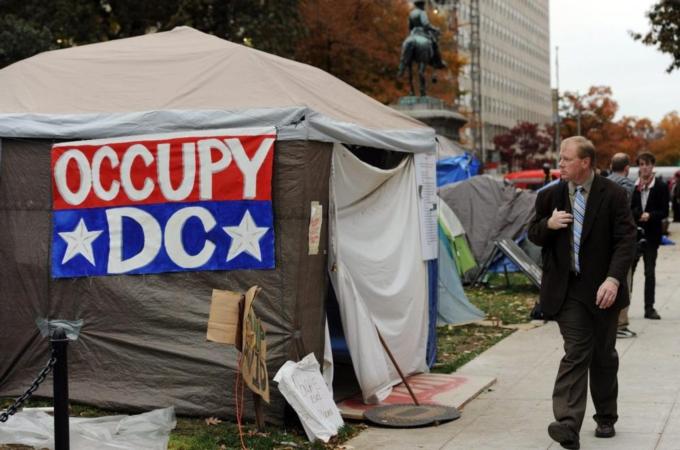
The 2008 financial crisis has sparked renewed interest in the writings of Karl Marx, says Zabala [EPA]
|
|
Barcelona, Spain - Reading and
writing about Karl Marx does not necessarily make you a communist, but
the fact that a number of distinguished philosophers are reevaluating
Marx's ideas certainly means something. After the autumn 2008 global economic crisis, new editions of Marx's texts returned to our bookstores accompanied by a large number of introductions, biographies, and new interpretations of the German master. While this resurrection was undoubtedly caused by the financial meltdown allowed by our democratic governments, Marx's revival among philosophers is not as simple a consequence as many believe. |
Indigenous Colombians: 'We're the ones dying'
Indigenous people in Colombia's southwestern region of Cauca say they have had enough of being caught in the middle of the country's long-running civil conflict.
The Imam and the Colonel
| The Imam and the Colonel | ||
|
Could the end of Muammar Gaddafi's rule help solve the mystery surrounding the fate of a missing Lebanese imam?
|
||
|
|
||
|
Filmmaker: Abdallah El-Binni The downfall of Libyan leader Colonel Muammar Gaddafi last year was greeted with great hopes for the rebirth of a nation. But there was another hope felt by many inside and outside of the country - that the end of his 42-year rule would allow some light to be shed on the fate of a charismatic Lebanese cleric. Imam Musa al-Sadr, the leader of Lebanon's Shia Muslims, disappeared, along with two companions, in the summer of 1978 during a visit to Libya to meet Gaddafi.
The enigmatic cleric's popularity had transcended religions. Calling for social justice and development, in 1974 al-Sadr founded the Movement of the Deprived - aiming to unite people across communal lines. Archbishop Youssef Mounes of Lebanon's Catholic Information Centre remembers a sermon al-Sadr delivered in a church, in which he warned of an imminent sectarian war. "It was a surreal scene," Mounes says. "Seeing the turban of a Muslim imam under the cross in a Christian church. He delivered a sermon at a very significant time." Raed Sharaf al-Din, al-Sadr's nephew, recalls how his uncle believed that Lebanon's sectarian nature could cut both ways: "Imam al-Sadr used to say that sects are a blessing, but sectarianism is a curse. It's a blessing to have this diversity of sects in Lebanon. But when there is strife among them, sectarianism is the worst thing for a country." |
Dirty money thrives despite Mexico drug war
| Dirty money thrives despite Mexico drug war |
|
Major banks are getting rich from money laundered by violent Mexican drug gangs, whistleblower says.
|
|
|
|
Cambridge, UK - Sitting in the smart
office of a London-based financial security firm, Martin Woods seems
far removed from the drug violence tearing at Mexico's soul. A former compliance officer with the US bank Wachovia, Woods - despite his unassuming demeanor and upper-crust British manners - has seen the drug war and its illicit loot in a light unavailable to even the most seasoned observers. |
Cartels cast shadow over Mexico polls
| Cartels cast shadow over Mexico polls |
|
Speculation rife over role of criminal syndicates as country votes for new president amid continuing drug violence.
|

Mexico's PRI party is widely believed to have made pacts with cartels and traffickers [Reuters]
|
|
Juarez, Mexico -
Covered in tattoos and working on a construction site in scorching
desert heat is a reformed cartel assassin Luis (a pseudonym), who killed
several men on orders from his bosses. "I was a bodyguard for one of
the biggest gang members in Juarez," he told Al Jazeera. "We killed
people, sold drugs and ran operations from inside prison and on the
streets." |
Mexican official: CIA 'manages' drug trade
| Mexican official: CIA 'manages' drug trade |
|
Spokesman for Chihuahua state says US agencies don't want to end drug trade, a claim denied by other Mexican officials.
|
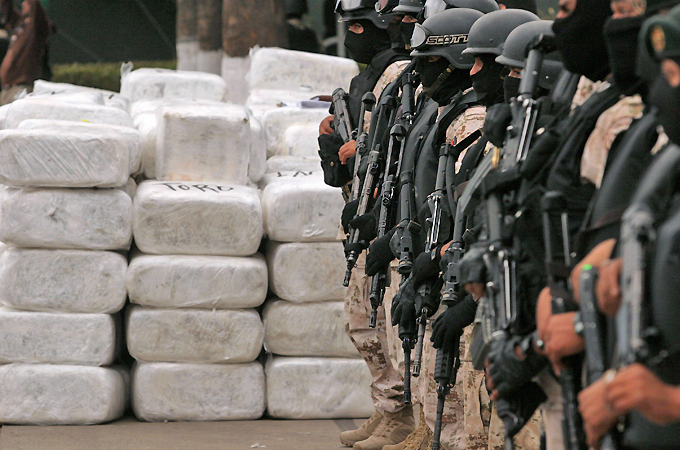
The CIA refused to comment directly on the allegations of complicity made by a low-level Mexican official [Reuters]
|
|
Juarez, Mexico - The US Central Intelligence Agency and other international security forces "don't fight drug traffickers", a spokesman for the Chihuahua state government in northern Mexico has told Al Jazeera, instead "they try to manage the drug trade". Allegations about official complicity in the drug business are nothing new when they come from activists, professors, campaigners or even former officials. However, an official spokesman for the authorities in one of Mexico's most violent states - one which directly borders Texas - going on the record with such accusations is unique. |
CIA finds stack of 'overlooked' documents on bin Laden movie
The Central Intelligence Agency recently discovered a "4 to 5 inch stack" of documents that relate to the spy agency's cooperation with the makers of a forthcoming Hollywood film on the raid that killed Osama bin Laden, according to a new court filing.
The documents about CIA dealings with the film now titled "Zero Dark Thirty" were "inadvertently overlooked" in response to a Freedom of Information Act request and lawsuit filed by the conservative watchdog group Judicial Watch, Justice Department attorneys said in a motion filed in federal court in Washington Tuesday afternoon (posted here).
Mitt Romney accuses Barack Obama of classified bin Laden leaks. Steven R Hurst
Republican presidential candidate Mitt Romney moved today from his attacks on Barack Obama's handling of the struggling US economy to a charge that the president sought political gain by leaking classified details of the raid that killed Osama bin Laden.
Romney planned to make the accusation today during an address to the Veterans of Foreign Wars national convention. Obama addressed the VFW yesterday as both candidates shift, if briefly, from economic issues to military affairs and foreign policy.
US places relatives of Sinaloa cartel drug lord on kingpin list
By Associated Press
MEXICO CITY — The U.S. Treasury Department announced Tuesday that it has imposed sanctions on relatives of Sinaloa cartel drug lord Juan Jose Esparragoza who allegedly run gas stations, a shopping mall, a housing development and an industrial park in Mexico that invested or laundered drug money.Six of the people named are wives or children of Esparragoza, alias “El Azul” or “The Blue One.” The department said he had at least two wives.
At Least 42 Killed in Southern Tajikistan Fighting
At Least 42 Killed in Southern Tajikistan Fighting
Military Attacks Rebels Near Afghan Border
by Jason Ditz
At least 42 people were killed today and possibly quite a few more according to various reports from officials in Tajikistan, after the Tajik military launched a major offensive against rebels in the southern Gorno-Badakhshan Province. Scores of others were reported wounded.
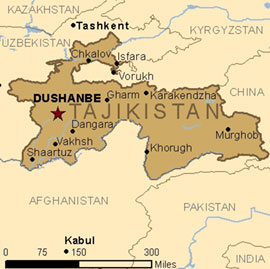 Gorno-Badakhshan
is an autonomous province in the far east, home to ethnic Pamiris. The
province declared independence in 1992 but was crushed in the ensuing
civil war. After the civil war, many of the former rebels were given
government jobs as part of a UN-brokered reconciliation plan. They have
mostly been driven out of their positions by the regime, fueling
discontent.
Gorno-Badakhshan
is an autonomous province in the far east, home to ethnic Pamiris. The
province declared independence in 1992 but was crushed in the ensuing
civil war. After the civil war, many of the former rebels were given
government jobs as part of a UN-brokered reconciliation plan. They have
mostly been driven out of their positions by the regime, fueling
discontent.The offensive was announced after a top Tajik general was stabbed to death and the rebels were blamed. Officials say that while today’s offensive went well, more attacks are planned for tomorrow.
The initial military statement for today’s offensive said 12 soldiers and 30 rebels were killed, but other official outlets said 20 or more Tajik soldiers were slain. A number of ambulances were seen pouring into the capital city later in the day, apparently ferrying wounded soldiers to hospitals.
Afghan Police Commander, 12 Other Officers Defect to Taliban
Afghan Police Commander, 12 Other Officers Defect to Taliban
Afghan Govt. Denies Claims Two Members of Peace Council Also Defected
by Jaso
Farah Province officials are expressing serious concern today after the police commander from Bala Boluk District defected to the Taliban, taking 12 other police officers and a large quantity of weaponry and military vehicles with him.
 On the way out the commander, identified in reports only as Mirwais, apparently poisoned seven other police who refused to defect with him. They are still recovering in Farah hospital in the capital.
On the way out the commander, identified in reports only as Mirwais, apparently poisoned seven other police who refused to defect with him. They are still recovering in Farah hospital in the capital.Defections are not unheard of, but in the past Afghan officials have insisted they were “infiltrators” when they joined in the first place. They are calling this defection the “first” time a large group left with so many weapons.
But officials are denying other repotrs that two members of the Afghan High Peace Council had also defected to the Taliban. In this case the defectors were not named.
Israel Pins Bombing on Hezbollah to Get EU Terror Ruling
Israel Pins Bombing on Hezbollah to Get EU Terror Ruling
by Gareth Porter,
The Netanyahu claim in interviews on Fox News Sunday and CBS’s Face the Nation of “rock solid” intelligence on the bombing was accompanied by an announcement that Israeli Foreign Minister Avigdor Lieberman would travel to Brussels Monday to meet with EU foreign policy chief Catherine Ashton and foreign ministers of nine EU member states to persuade them to put Hezbollah on the list of terrorist organizations.
Is Iran a Threat?
On Thursday, Feb. 2, 2012,
I gave a talk at the Rotary Club of Monterey. I’ve spoken there
two or three times in the past, always with a good response, but always
on economic issues. This time I decided to push the envelope by
making my case that the Iranian government, while it is a threat to
its own people, as all governments are to various degrees, is not a
threat to the United States. The president of the club told me
that the turnout for the speech, whose topic was announced well in advance,
was unusually high. I would estimate it at 120 to 140.
Yawn: Romney Goes Abroad
If you didn’t know that Mitt
Romney is taking his campaign overseas this week to share his
Mittastic worldview with the great people of England, Poland, Germany
and Israel, don’t worry, not many do. Or care.
Announced early this month, Gov. Romney’s upcoming deployment to these places will serve, presumably, to help boost his foreign policy credentials, which at this point are pretty non-existent. His advisers said in a recent press briefing that he will be “learning and listening” and “forging” ties. It isn’t clear, however, how chumming with the Brits right before the Olympics will do anything more than recall his “saving” the 2002 games in Salt Lake City or make a few Republican expats feel good. Apparently that’s the point. Poland and Germany are safe bets and decent photo ops, too. But in reality, only Israel offers the chance to hear Romney vocalize his positions on a critical international flashpoint — the War in the Middle East.
Announced early this month, Gov. Romney’s upcoming deployment to these places will serve, presumably, to help boost his foreign policy credentials, which at this point are pretty non-existent. His advisers said in a recent press briefing that he will be “learning and listening” and “forging” ties. It isn’t clear, however, how chumming with the Brits right before the Olympics will do anything more than recall his “saving” the 2002 games in Salt Lake City or make a few Republican expats feel good. Apparently that’s the point. Poland and Germany are safe bets and decent photo ops, too. But in reality, only Israel offers the chance to hear Romney vocalize his positions on a critical international flashpoint — the War in the Middle East.
Tuesday, July 24, 2012
Of Course U.S. Rebalancing Is about China. by Justin Logan
Brad Glosserman has penned a provocative article
arguing that America's rebalancing toward the Asia-Pacific isn't about
"fear of China." Fear may be too strong a word, but the argument is
still wrong. Of course it's about China.
It's telling that Glosserman's article itself is all about China. For
instance, he mentions Washington's support for freedom of navigation in
the South China Sea. But the recent friction hasn't been between
Vietnam and the Philippines. It isn't Malaysia claiming almost all the territorial waters there. No, the current panic in the South China Sea is all about China.Conversations with 'Gov. Gary'. by Gene Healy
Last fall, GQ ran a profile of former New Mexico Gov.
Gary Johnson, then a candidate for the Republican presidential
nomination, under the headline "Is This the Sanest Man Running for
President?" The piece noted that in 2003, Johnson scaled Mount Everest
with a broken leg, and in 2005, broke his back paragliding off the
highest mountain in Maui. "Sanest"? Well, maybe not.
But Johnson, now running on the Libertarian Party ticket, is
certainly the most interesting candidate in the 2012 field — and that's
not an attempt to damn with faint praise.Mitt Romney Vs. Republican Bigotry
|
|
 ormer
Massachusetts governor and current U.S. presidential candidate Mitt
Romney may succeed in tapping into the coffers of former financial
backers of the Bush family’s political fortunes. One would expect no
less from a man who has all the patrician bearing of George Bush, Sr. ormer
Massachusetts governor and current U.S. presidential candidate Mitt
Romney may succeed in tapping into the coffers of former financial
backers of the Bush family’s political fortunes. One would expect no
less from a man who has all the patrician bearing of George Bush, Sr.
But all of the money raking, supremely important as it is in U.S. elections, may do him no good in the end.
At a recent discussion, I asked a speculative question about the
policies of a future Romney Administration. It was a largely Republican
crowd, and I had tried to be nice. To no avail. As I was walking out
after the event, a septuagenarian defense type sidled up to me and
hissed under his breath, “This country will never elect a Mormon as
president.”
And then I realized that the man, acting so adamantly against his
own basic political instincts, had basically pronounced Barack Obama’s
reelection. Lots of disappointed liberals may stay home in November
2012, but so will a lot of Republicans if Mitt Romney is their party’s
standard-bearer.
|
Rebuilding Through Reform: How to Ensure Global Financial Stability
 |
Photo credit: SVLuma/Shutterstock.com |
|
Globalist Perspective
> Global Finance Rebuilding Through Reform: How to Ensure Global Financial Stability |
|
By Esther L. George | |
While
policymakers are busy trying to mitigate the damage of the recent
financial crisis, they also need to be thinking ahead to the next
crisis. Esther L. George, president of the Federal Reserve Bank of
Kansas City, urges policymakers to ask what really went wrong last time —
and what can be done to build a more resilient financial system for the
future.
 he
current crisis is following much the same pattern of previous financial
crises — an inability or unwillingness to see the warning signs and
take preventive action, followed by massive damage, and then working
through the emergency policy steps and the rebuilding of our financial
system. he
current crisis is following much the same pattern of previous financial
crises — an inability or unwillingness to see the warning signs and
take preventive action, followed by massive damage, and then working
through the emergency policy steps and the rebuilding of our financial
system.
We must also recognize that our resolve in dealing with financial crises unfortunately tends to diminish after a crisis passes. Understandably, financial institutions want to get back quickly to a more profitable state, and the public wants a prompt and painless return to the prosperity they enjoyed before the crisis. As a result of this substantial pressure, many policymakers and market participants become reluctant when it is time to make the hard judgments about effective reforms and instituting greater risk restraints. Signs of this are already occurring with the efforts by financial institutions and others to weaken or delay stronger capital standards and other provisions of the Dodd-Frank Act. That would be unwise. |
Tyrants and Human Nature
Tyrants and Human Nature
Crovitz: Who Really Invented the Internet?
Crovitz: Who Really Invented the Internet?
It's an urban legend that the government launched the Internet. The myth is that the Pentagon created the Internet to keep its communications lines up even in a nuclear strike. The truth is a more interesting story about how innovation happens—and about how hard it is to build successful technology companies even once the government gets out of the way.
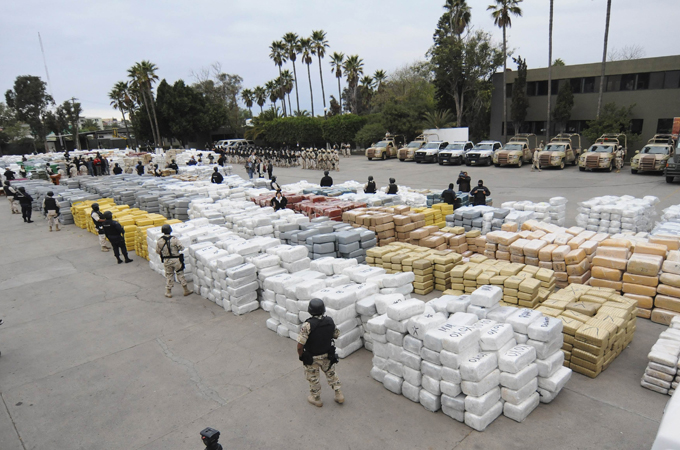






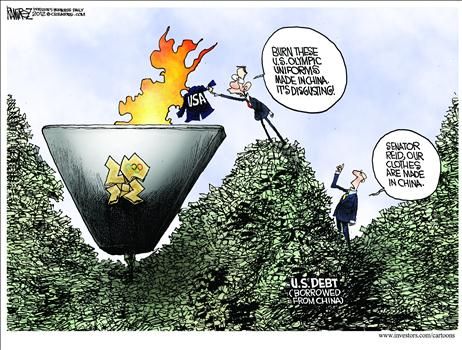

No comments:
Post a Comment